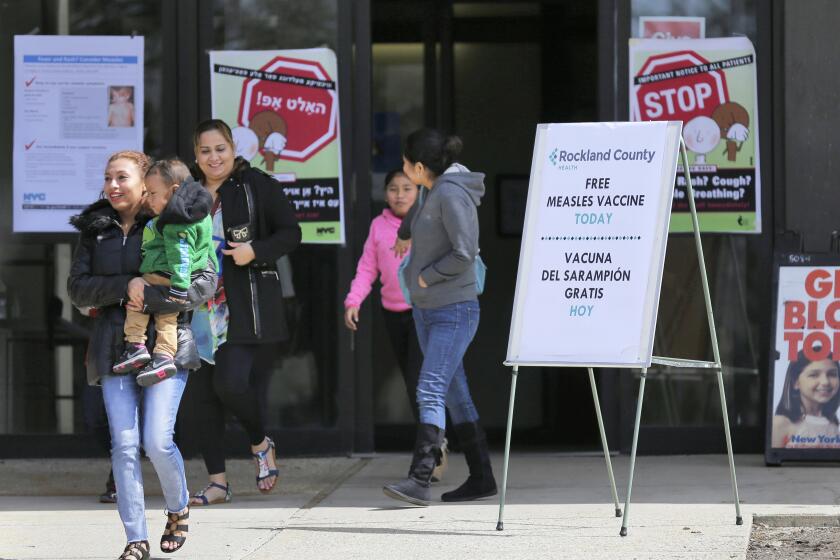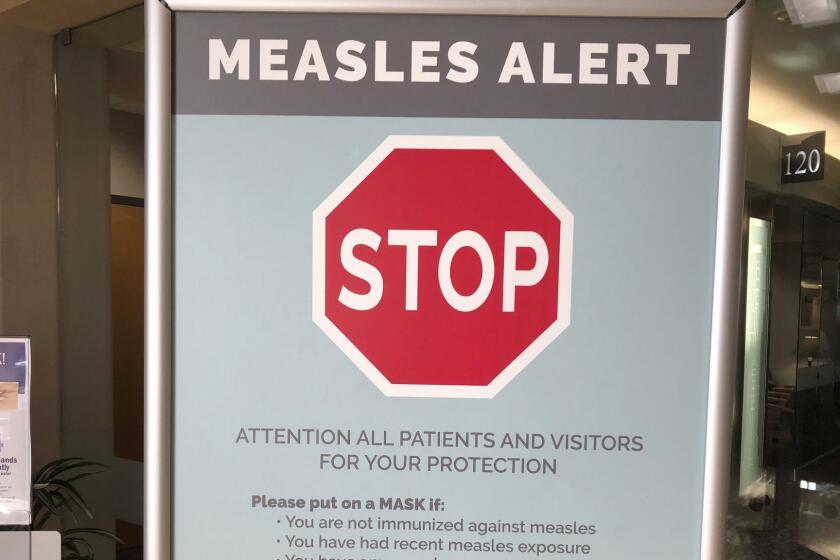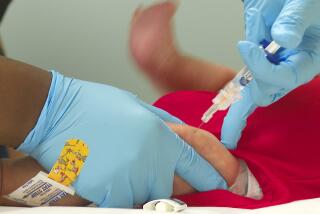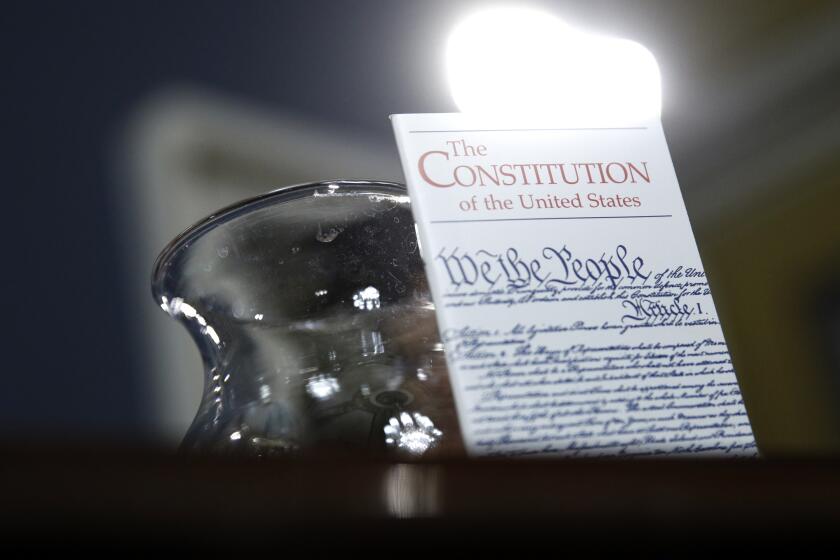Editorial: A dangerous dip in confidence in vaccines puts kids at risk from preventable disease
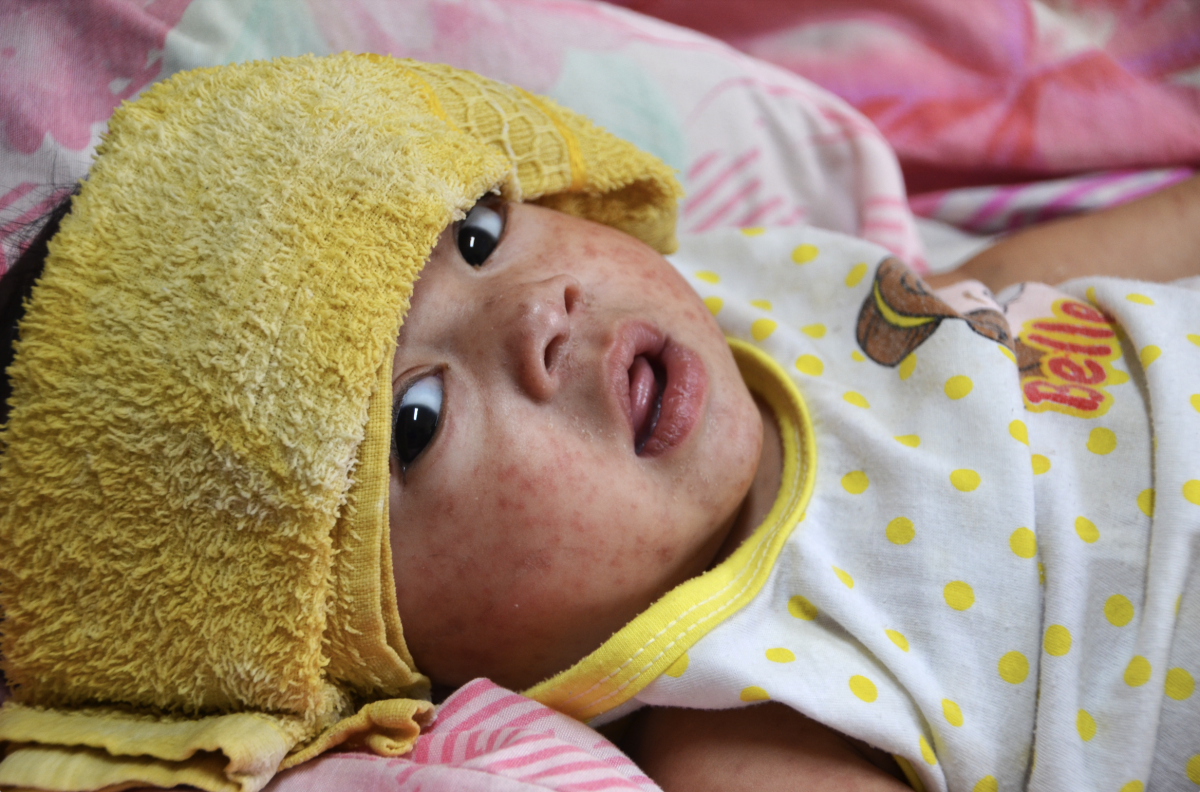
- Share via
We live in an age of advanced scientific knowledge that produces vaccines that can ward off diseases such as measles, rubella, mumps and polio. We also live in an age when an increasing number of parents want the option of not vaccinating their children against these highly contagious and potentially fatal diseases.
Only 71% of people recently polled by the Kaiser Family Foundation believe that parents should be required to vaccinate their children to attend public schools, compared with 82% in 2019, the same as in 2016. This is akin to thinking that driving through a red light won’t have any consequences.
The poll reflects a small but growing percentage of parents choosing not to vaccinate their kids against preventable childhood diseases driven by a surge in misinformation spread online through social media. And it’s having a real effect on public health. A measles outbreak in Columbus, Ohio, in November sickened 82 children, most of them unvaccinated and younger than 5. None of them died, but 32 were hospitalized.
Measles vaccinations dropped for kids during the pandemic, setting the stage for disastrous outbreaks.
Public health officials traced the outbreak to public locations including a dollar store, a church and two department stores. Measles is highly contagious and can live in the air for two hours after an infected person leaves, according to the Centers for Disease Control and Prevention.
Measles was declared eliminated from the United States in 2000, about 40 years after the live measles vaccine was first licensed. But confidence in immunizations has been waning, and this is not the first outbreak of measles in the United States in recent years. The CDC reported 1,274 individual cases of measles in 31 states in 2019, by far the greatest number since 1992. Many of those cases were connected to an outbreak in late 2018 and early 2019 among New York City’s Orthodox Jewish community, which had low vaccination rates.
All states have laws requiring children to be vaccinated against certain diseases such as measles to attend public schools; however, medical exemptions are allowed in certain circumstances. Some states, including Ohio, offer exemptions on medical, religious or moral grounds. Not surprisingly, an increasing number of parents or guardians in some regions of Ohio are increasingly filing moral or religious exemptions to the vaccine requirements, according to the Dayton Daily News.
In California, kids need to get vaccinated to attend public and private elementary and secondary schools, child-care centers, family day-care homes, nursery schools, day nurseries and pre-K facilities. Religious or personal belief exemptions were ended in California after a measles outbreak traced to Disneyland in 2014. The state law helped increase vaccination rates about 3% statewide, helping California almost reach herd immunity, which is when 95% of children receive both doses of their measles vaccines.
The United States shut the door on measles, one of the most contagious diseases known to humans, in 2000 — declaring it to have been “eliminated,” for all intents and purposes.
Distrust in vaccines is a global issue. So many kids are opting out of the measles vaccines that the public health officials now consider this preventable disease an imminent threat in every region of the world. Late in 2022, the World Health Organization reported the lowest global coverage vaccination rate for measles, with only 71% of children worldwide receiving a full two doses of vaccines against measles.
Hesitancy about the safety and need for immunizations to combat childhood diseases was growing in the U.S. even before the COVID-19 pandemic. But public health experts believe misinformation and the politicization of COVID-19 vaccine mandates have fueled this trend. Most opponents of public school vaccine mandates identify as Republican, according to the KFF poll. The percentage of Republicans who believe that parents should be able to opt out of required school vaccines more than doubled from 20% in 2019 to 44% in 2022.
By trusting social media influencers pushing misinformation over the advice of pediatricians and public health experts, parents are leaving children exposed to measles infections that bring rash, fever, coughing, inflamed eyes, sore throat and, potentially, swelling of the brain, long-term disabilities and death. Expect even more measles outbreaks in the U.S. and elsewhere unless vaccine coverage improves. That means states must follow California’s lead and crack down on nonmedical exemptions so that misinformed parents don’t have the option to put their kids, and other people’s kids, at risk.
More to Read
A cure for the common opinion
Get thought-provoking perspectives with our weekly newsletter.
You may occasionally receive promotional content from the Los Angeles Times.
